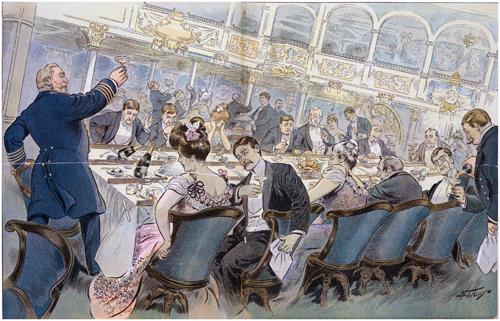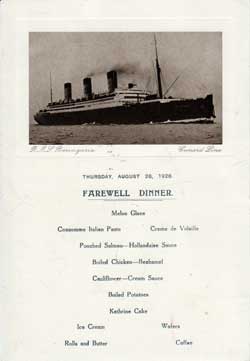The Captain's Farewell Dinner onboard an Ocean Liner
by Bell L. Sanford

Preparations went on all the afternoon in the dining room of the "Graf Waldersee" of the Hamburg America Line for the Boat-Captain's Dinner. The "Captain's Dinner," by the way, given just before the end of the voyage, is always quite a grand affair.
The December air of the North Sea was too cool to make it now pleasant to sit outside on deck, although our little party of three had spent most of the days of the sea-journey across the Atlantic in our steamer chairs. (The big ruddy-faced captain had put on his overcoat for the first time the day before.) But the next morning our steamship would land at its destination, Hamburg, so the intervening time before the dinner was comfortably spent indoors in anticipation of the event.
The well appointed dining room, we found that evening, had undergone a wonderful transformation. At first the room was darkened and in brilliant illumination the words "Auf Wiedersehen" ("Till we meet again," or "Good-bye,") shone bravely out. Both very large and very tiny flags were arranged artistically about the room, and many different kinds of bright red, green, blue and yellow Chinese lanterns were suspended from the ceiling.

The pictures too, on the walls were wreathed with garlands of roses in honor of the occasion. The Christmas-tree gaily adorned with glittering tinsel ornaments of various forms, colors, and sizes, and lighted -- one of six Christmas trees used on board the ship on Christmas Eve, three days before, was still in the dining room and added to the splendor of the decorations.
Uncle Sam and Germania in fantastic holiday attire kept each other company in a dignified fashion at one end of the room. The brass band which had played on deck marched in and around the long tables playing lively music followed by the table-waiters in grotesque masks and dressed as girls and women. The waiters, retaining their costumes, presented a striking contrast as they served the dinner to their usual appearance when immaculately and ceremoniously attired in their dark blue suits with low-cut vests, white gloves and white ties.
One old lady, very benevolent, who beamed at everyone through her large-featured mask and who wore a calico dress, and a blue apron tied with narrow strings, each of a different color, which dangled flatly below her broad back; also a gingham sun-bonnet, and who had a decided limp as she carried dishes back and forth, using a bunchy umbrella as a cane, showed special favors to those who were nice to her.
Another was dressed in a yoked Mother Hubbard, the skirt of which clung in the way skirts usually cling to wide-waisted masculine forms when there are no under-skirts beneath -- only trousers -- and a round hat banded with red ribbon and fastened on by an elastic cord under the short-cut hair at the back of the head. The others of the retinue were appareled in keeping with their companions.
On the tables were tall brown fantastically shaped cakes with curling petals called "baumkucken," or tree-cakes, ornamented with flowers, leaves and tiny flags -- German and American -- reminding one of the Chinese pagodas with their storied projectioris. Fanciful caps of paper in a variety of shapes were taken from the lower part of the cake-dishes and donned by the guests who made a comical appearance in them.
The young American doctors and their wives on their way to Berlin, as also the learned geologist and wife; the handsome Russian music professor, who said "peety, peety," (Pity) when the disc went over the line in playing shuffleboard on deck; the Jewish commercial man who traveled in many lands and who affirmed that American pie was the best on earth; the German maiden lady who had an Angora cat -- with a feathery tail that waved to and fro like a willow plume -- and for which she had bought a ticket; the Hungarian-American engineer; the dignified Englishman and wife from New Jersey, out and back for the sea-trip; and all the other first-cabin passengers -- all took part in the merriment.
Seated among the others were the ship's doctor, known by the gilt serpents on each of his coat lapels, and the faithful captain who had stayed up all the night before to see that the ship safely passed the narrow channel between Calais and Dover.
We forgot all about the rough, stormy sea of a few days before when the waves dashed high from the rocking of the boat, striking it with thunderous blows, and the dishes and glasses slid up and down, and back and forth like a game of catch and toss against the frames placed on the tables; and once when one of the passengers slid from her steamer chair and rolled down hysterically with a lurch of the boat over and over like a rolling-pin to the rail, yet fortunately escaped unharmed and of the man who had jumped overboard because he did not arrive in Hamburg in time to spend Christmas with his family.
The frames had been removed from the tables and the pretty glasses and dishes bearing the nautical design of the "H. A. P. A. G." in the form of the embellished anchor, now remained where they were placed.
Although the ship's larder must have been rather low at the end of the voyage, prolonged three days, the excellent eight-course menu, printed in both German and English, consisted of:
- Windsor Soup
- Halibut à la Menmiere
- Crusted Sweet Breads with Peas
- Fillet of Beef à la Financiere
- Asparagus with foam Butter
- Roast Duck with Peach Preserves and Lettuce
- Ice Cream with Ladies' Tart
- Cheese, Grapes, Pineapple
- Apples, Bananas
- Coffee
The ice cream brought in on trays formed an important feature of the dinner, for it was illuminated, and looked very pretty. At the close of the repast, a young German doctor at the Captain's table, made a little speech and proposed three cheers for the captain which were given, and not three cheers only, but -- three cheers, given three times.
Source: Table Talk: The American Authority upon Culinary Topics and Fashions of the Table, Vol. XXVII, No. 12, December 1912, Pages 683-684. Published Monthly by The Arthur H. Crist Co., Cooperstown, NY. A Monthly Magazine Devoted to the Interests of American Housewives, Having special reference to the Improvement of the Table. Marion Harris Neil, Editor.
Sample Dinner Menu illustrated above -- Farewell Dinner Menu, RMS Berengaria 1926 - from the Gjenvick-Gjønvik Historical Menu Collection
About the Illustration: "He meant well" by Samuel D. Ehrhart (1862-1937), originally Published 11 May 1904.
